Elizabeth Birr Moje has spent most of her career at the intersection of education, justice and innovation, developing long-standing programs and research projects that advance the quality of life for Detroiters while addressing systemic issues that have held residents back.
“Schools matter for neighborhoods. And neighborhoods matter for schools,” says Moje, dean of the Marsal Family School of Education at the University of Michigan.
“Schools matter for neighborhoods. And neighborhoods matter for schools.”
Moje’s research and teaching methodologies have primarily centered on recognizing and addressing the loose ends between student performance and gaps in the ecosystems around their schools, especially in Detroit neighborhoods. It’s always been a group effort, she says.
“I have never really felt like I’m doing anything by myself,” Moje says. “I seek other people along the path to work with me or me to work with them, to collaborate, to build a collective, to try to collectively get to that meaningful impact, that difference. So, if that’s a pathbreaker, I guess I am one, but I am never alone.”
“I seek other people along the path to work with me or me to work with them, to collaborate, to build a collective, to try to collectively get to that meaningful impact, that difference.”
The collective energy around Moje and her partners has been expansive. For example, one of her many research studies identified a link between teacher turnover and student morale. So Moje and her collaborators implemented programming that would encourage student teachers to stay working in Detroit – programming that includes increasing credit hours before college admission at the beginning stage and ensuring teachers are paid a competitive wage.
Additional studies have focused on decreasing poverty rates in neighborhoods, which would ideally lead to healthier parent engagement, more advocating to improve youth literacy rates, and stronger connections between K-12 schools and universities, particularly in Northwest Detroit at the Marygrove Learning Community, a partnership between the University of Michigan, Detroit Public Schools Community District, Starfish Family Services and the Marygrove Conservancy.
“I haven’t found it hard to convince people who care about education and learning and justice,” she says, “because everybody who cares about those things wants to be part of a collective where we have hope for making change and for achieving high-quality education…and ensuring that children have what they need to be able to make the most of those opportunities.”
Moje grew up in Bay City but spent a lot of time in Detroit, going to Tigers games and other city events long before grounding much of her research and programming there.
“I believe if you want to be connected, you have to build trust and build relationships,” Moje says about working in the city. “I just love the way that Detroiters know their neighborhoods. They have that rootedness and continue to care and find meaning in the value of those neighborhoods.”
“I believe if you want to be connected, you have to build trust and build relationships.”
And the work continues. In 2024, the Learning, Equity, and Problem Solving for the Public Good program (LEAPS) began at Marygrove. The first-of-its-kind undergraduate degree program is designed to have students live and learn together on the Marygrove campus, where they interact with students who attend the public elementary and high schools on campus.
Kresge has supported Marygrove’s transformation from a shuttered college to its current formation – a birth-to-post-secondary educational campus – with grants from the Detroit Program and more than half a dozen social investments from the Social Investment Practice, totaling a commitment of more than $75 million since 2016.
As LEAPS takes off, Moje says she remains grounded in the symbiotic relationship between her mission and the outcomes of the communities she and her collaborators have served.
“I do feel like I have a purpose,” she says. ” …Purpose matters a great deal in learning. We know that when a person has a sense of purpose, they are more likely to learn effectively because they have a goal. They’re working toward that goal; they’re motivated to persist. So, in that sense, having a purpose and creating meaningful transformation is, for me, as close as I get to being a pathbreaker.”





